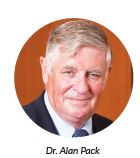I have been in the field of sleep research since 1981. It has been a wonderful journey. In the early years, there was limited acceptance of the importance of sleep and the relevance of sleep disorders. Over the years, this has slowly changed as a result of the outstanding research that has been done and the commitment of many individuals worldwide. Development of fields can be divided into phases; the first phase being the pioneer phase. For sleep research, this was in the 1970s and 1980s. This is followed by the phase of rapid growth. We are in the rapid growth phase, and there are enormous opportunities.

It is not just the increased recognition of the importance of adequate sleep and its disorders that makes this a great time to get involved in this exciting field. There are also effective treatments for common sleep disorders. Diagnostic studies are evolving that make the diagnosis more cost-effective and hence more widely available internationally. Sleep and its disorders are very applicable to new research approaches that support personalization of diagnosis and management. This includes the use of biomarkers, genetics, use of big data, and application of wearables to observe and track the sleep of individuals. Largescale genetic studies, based on resources such as the UK Biobank, are proving productive to identifying gene variants associated with sleep duration, insomnia and chronotype (the tendency for an individual to sleep at a particular time during a 24-hour period). In basic research, we are now transforming our understanding of the neuronal circuits regulating sleep. In many respects, investigators in sleep research have been in the lead in applying these approaches.
Hence, it is a time of great opportunity. Programs of World Sleep Society and other universities and societies are bringing opportunities to trainees in many countries—and we are already seeing the field of sleep medicine and research rapidly developing in all parts of the globe. Thus, my message is simple—get involved. If you are entering school or selecting a path, consider choosing sleep. This is fun and you can make a major difference.
………………………………………………………………………….
Allan I. Pack, MBChB, PhD is the John Miclot Professor of Medicine in the Department of Medicine/Division of Sleep Medicine at University of Pennsylvania Perelman School of Medicine in Philadelphia, Pennsylvania.



